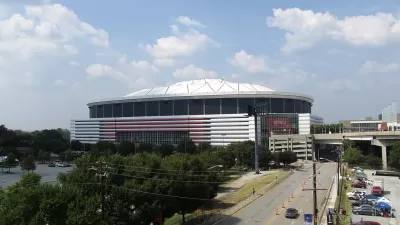HBO's John Oliver wants cities to do one thing when professional sports teams come asking for public money to build new stadiums: "Make them pay!"

"Most stadiums these days look like they were designed by a coked-up Willy Wonka," says John Oliver near the beginning of a recent segment that absolutely obliterates the recent history of professional teams taking pretty much whatever they want from cities to get the facilities they want. But Oliver's concern isn't the excess on display at these stadiums—it's the tremendous paid by taxpayers to build these new facilities.
Between 2000 and 2010, $12 billion went toward new facilities for professional teams, explains Oliver. In fact, since the 1990s, professional sports teams have a replacement rate of 90 percent. "Which begs the question," says Oliver: "Why?" Oliver can't find an answer to that question, citing a study that finds no evidence that stadium investments increase "jobs, incomes, or tax revenues."
Despite that lack of return on investment, almost every team gets something, according to Oliver. The New York Yankees, for instance, paid for their own new stadium—but it was built on land given rent and property tax free, costing the city hundreds of millions in lost revenue. May teams benefit from tax-free municipal bonds, which, as Oliver explains them, are usually spent on things like roads and schools. Among a slew of cities mentioned in the post for embarrassing capitulations to professional sports teams, Cincinnati stands out. Still paying back debts for stadiums built for the Bengals and Reds teams, Oliver notes that the taxpayers of the city are obligated to buy the Bengals a holographic instant replay machine—if and when such a device is ever invented.
Such are the lengths cities and their citizens are willing to go to for professional sports. But Oliver has a different idea: "We have to come to our senses, and stop signing these deals."
FULL STORY: John Oliver: It’s time to stop taxpayer-funded stadiums

Planetizen Federal Action Tracker
A weekly monitor of how Trump’s orders and actions are impacting planners and planning in America.

Congressman Proposes Bill to Rename DC Metro “Trump Train”
The Make Autorail Great Again Act would withhold federal funding to the system until the Washington Metropolitan Area Transit Authority (WMATA), rebrands as the Washington Metropolitan Authority for Greater Access (WMAGA).

The Simple Legislative Tool Transforming Vacant Downtowns
In California, Michigan and Georgia, an easy win is bringing dollars — and delight — back to city centers.

The States Losing Rural Delivery Rooms at an Alarming Pace
In some states, as few as 9% of rural hospitals still deliver babies. As a result, rising pre-term births, no adequate pre-term care and "harrowing" close calls are a growing reality.

The Small South Asian Republic Going all in on EVs
Thanks to one simple policy change less than five years ago, 65% of new cars in this Himalayan country are now electric.

DC Backpedals on Bike Lane Protection, Swaps Barriers for Paint
Citing aesthetic concerns, the city is removing the concrete barriers and flexposts that once separated Arizona Avenue cyclists from motor vehicles.
Urban Design for Planners 1: Software Tools
This six-course series explores essential urban design concepts using open source software and equips planners with the tools they need to participate fully in the urban design process.
Planning for Universal Design
Learn the tools for implementing Universal Design in planning regulations.
Smith Gee Studio
City of Charlotte
City of Camden Redevelopment Agency
City of Astoria
Transportation Research & Education Center (TREC) at Portland State University
US High Speed Rail Association
City of Camden Redevelopment Agency
Municipality of Princeton (NJ)





























